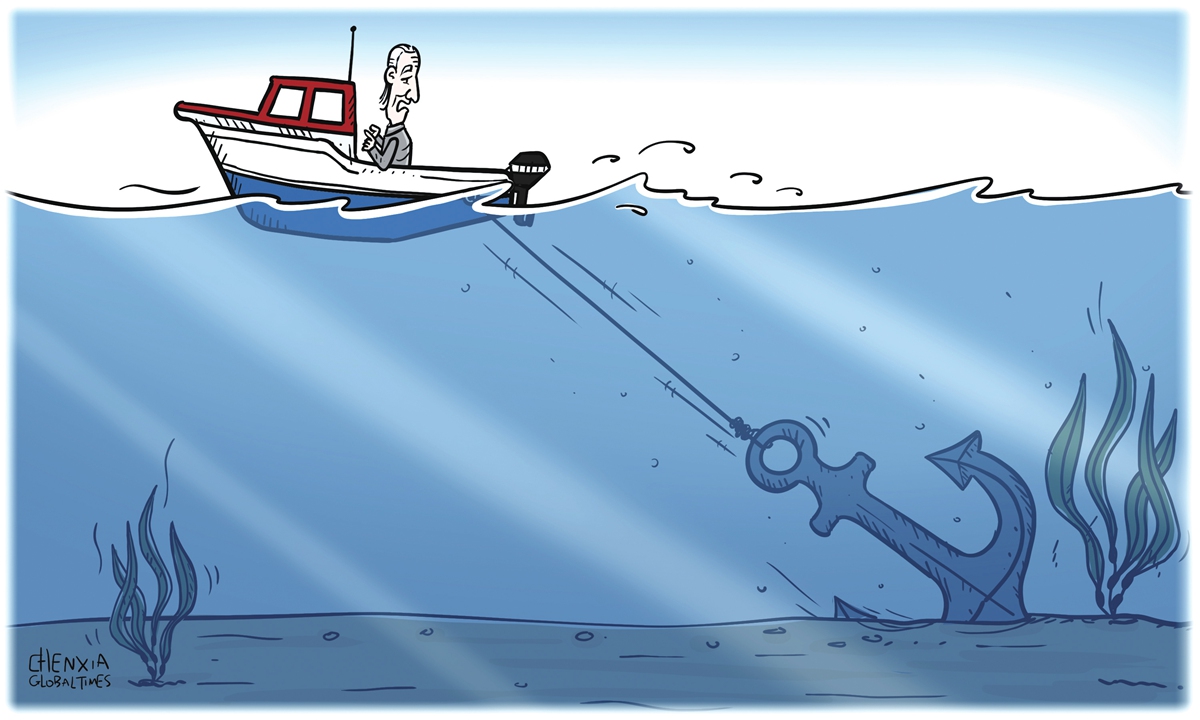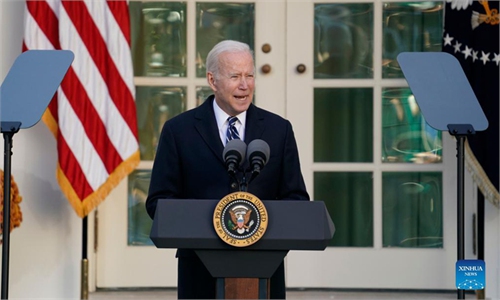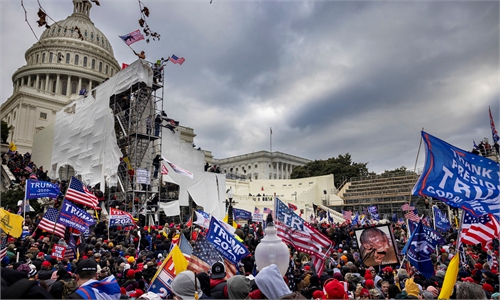
Illustration: Chen Xia/GT
It's been one year since Joe Biden took office as US president. It is a tradition in the US for the president to deliver the State of Union address in January or February. However, Biden decided to postpone it to March 1. This may indicate that the White House is not so confident about its accomplishments. Both Biden and the Democratic Party will also have to face the serious challenge posed by the 2022 midterm elections in the US Congress. But things could get even worse in another two months.
The Biden administration is now facing five major governance challenges. They are the resurgence of the COVID-19 epidemic, the supply chain crisis, high inflation, rising energy prices, and the migrant crisis at the US-Mexico border. Although the White House pushed Congress to pass the American Rescue Plan Act and Bipartisan Infrastructure Law, it's now experiencing the "Biden Bubble." The US Department of Labor announced on January 12 that the country's consumer price index rose 7 percent in December, the highest increase since June 1982. The spread of the Omicron variant has cast a shadow over the US economy. The World Bank has cut its forecast for US economic growth once again.
The supply chain crisis is closely related to the US-launched trade war. Yet, the Biden administration is hesitant to make any change in its trade policy for fear of losing votes, and this, in turn, is hindering Biden's economic performance. Even though US Trade Representative Katherine Tai has outlined a "worker-centered trade policy," maintaining high tariffs on goods from countries like China has forced ordinary working families in the US to bear a huge cost. The policy Tai has been stressing may also discriminate against American workers because it's likely to only benefit workers in traditional manufacturing industries, like as those related to steel and aluminum production.
Compared with the beginning of Biden's presidency, the domestic political rift in the US has deepened. Biden described the Jan 6 attack on the US Capitol as an attempted "coup" and accused Republicans of spreading lies about the 2020 US presidential elections. A poll in late December showed that a third of Americans still question the legitimacy of Biden's victory a year since rioters breached the US Capitol. Republicans are planning to carry their push to reshape the nation's electoral system in an effort to influence the 2022 and 2024 elections.
The fierce partisan dispute over voting rights reflects the seriousness of the democratic crisis in the US. Biden criticized a new Georgia voting law, saying "the votes of nearly 5 million Georgians will be up for grabs if that law holds." The Freedom to Vote Act pushed by Democrats met huge resistance from Republicans in Congress.
The internal division has exerted constraints on the Biden administration's ambition to regain world leadership. Biden emphasized "America is back," but the world needs to first ask what the US is willing to do for it. The Biden administration's diplomacy is in essence, the Democratic version of "America first." The general trend of the US competing with its allies and partners for interests continues. When dealing with the Biden administration, US allies and partners worry that Trump and the political forces he dominates will return to the White House in 2024. Any negotiations with the Biden administration may be overturned two years later.
The Biden administration's rash withdrawal from Afghanistan not only showed the failure of its strategy for advocating democracy, but also embarrassed NATO. The US sacrificed the interests of France to form the AUKUS alliance, which accelerated Europe's pace to seek strategic autonomy. The US and NATO are becoming more and more assertive on the Ukraine issue, prompting the Putin government to implement a policy of brinkmanship. Even if Washington does not make a written promise to Moscow, it is expected to compromise.
China-US relations are agitated by the predicament the Biden administration is facing. Biden is trying to bridge the divergences between the Democratic and Republican parties by hyping China-related affairs, pushing forward his domestic policy agenda.
However, obviously, the top threat to the US is the US itself. The Biden administration needs to make great efforts to engage in nation-building from within. According to a January Quinnipiac University poll, 76 percent of the 1,313 adults polled believed instability in the US is a bigger danger to the US than other countries that are adversaries to the nation. 58 percent of the Americans polled said the nation's democracy is in danger of collapse.
The author is a senior research fellow at the Charhar Institute and an adjunct fellow at the Chongyang Institute for Financial Studies at Renmin University of China. opinion@globaltimes.com.cn



